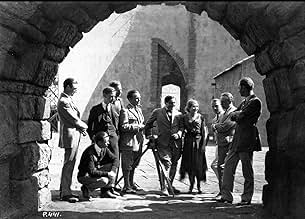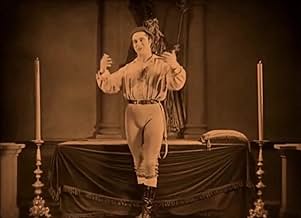Füge eine Handlung in deiner Sprache hinzuRosita, a peasant singer in Seville, captures the attention of the King.Rosita, a peasant singer in Seville, captures the attention of the King.Rosita, a peasant singer in Seville, captures the attention of the King.
- Auszeichnungen
- 3 wins total
Mathilde Comont
- Rosita's Mother
- (as Mme. Mathilde Comont)
George Bookasta
- Child Role
- (Nicht genannt)
Mario Carillo
- Majordomo
- (Nicht genannt)
Marcella Daly
- Undetermined Bit Role
- (Nicht genannt)
Charles Farrell
- Undetermined Bit Role
- (Nicht genannt)
Empfohlene Bewertungen
I'm sorry, but the audience who rejected this movie in 1923 were right: Mary Pickford just can't play it sexy. Neither is she convincing as a fiery ridiculer of authority. Her usual childlike impishness is sorely out of place here; when the king lusts after her, you have to suspect him of child molesting tendencies. However, the movie does have its funny moments, in a very Lubitsch way; the amusing efforts of the king to avoid the monogamous-minded queen make up for some deficiencies.
Legends abound concerning the contentious on-set relationship between superstar Mary Pickford and director Ernst Lubitsch during the filming of Rosita. Despite Pickford's later efforts to keep the film out of circulation, screenings of the picture revealed a delightful surprise: the great German filmmaker had provided Pickford with her wish -- the showcase for a juicy role miles away from her "little girl with the curls" persona. Only the tiniest indications of what would later evolve into the "Lubitsch touch" exist in the tale of a street singer who rises to prominence in the court of a philandering king (skillfully portrayed by Holbrook Blinn), but Rosita is a handsomely mounted production with charm, wit, and plenty of romance to spare.
"Set the table for three. Tonight we feast with death!"
It's a simple story and it moves a little slowly at times, but to see Mary Pickford playing a street musician and dancing a little jig, flirting with a traveling nobleman, and fending off the advances of the horny king, all under the direction of Ernst Lubitsch, hey I'm in. It's actually kind of hard to tell it's from Lubitsch, though the sets are gorgeous and the crowd scenes suitably lively, with the exception of this intertitle, which I chuckled over: "Good news! His Majesty graciously consents to your being shot." This is Pickford's show though, and she's as charming as ever.
It's a simple story and it moves a little slowly at times, but to see Mary Pickford playing a street musician and dancing a little jig, flirting with a traveling nobleman, and fending off the advances of the horny king, all under the direction of Ernst Lubitsch, hey I'm in. It's actually kind of hard to tell it's from Lubitsch, though the sets are gorgeous and the crowd scenes suitably lively, with the exception of this intertitle, which I chuckled over: "Good news! His Majesty graciously consents to your being shot." This is Pickford's show though, and she's as charming as ever.
The restoration is a thing of beauty, with sharp images, good tints, a Handschlegel sequence that is charming, beautiful set design, and photography by Miss Pickford's regular cameraman in this period, the great Charles Rosher. Ernst Lubitsch, in his first American film, directs to show off everything, offers a few grace notes, and has turned out an overlong movie.
I admire Lubitsch's comedies endlessly, but I am not so fond of his historical epics. I understand their popularity at the time. With Europe in the last days of the Great War, and a couple of years coming out of it, looking at luxury on screen was all the escape audiences could get from a devastated continent. Yet showing that luxury takes up screen time, and Lubitsch seemed to feel no need to fill it up for those of us who exhausted that pleasure quickly. As a result of this, while the opening sequences of Carnival, waiting for Miss Pickford to appear amidst the innumerable extras, is exciting and fun and even a bit suspenseful, the constant barrage of magnificent clothes and high glass shots while Miss Pickford shows she is a great actress palled on me. She had already shown her range in an assortment of roles eight years earlier, when she played Indian girls, Scottish lasses and Madame Butterfly. In those movies, she had shown her range by offering her audiences drama and comedy. In this movie, it's Mathilde Comont and George who get the giggles, while Miss Pickford gets to do an 18th Century Suffering In Mink role in slow motion. Her features had been an hour in length. This one stretches to 100 minutes.
One of the reasons that Miss Pickford wanted to make this movie is she was tired of the popular movies she had made over the last few years, in which she played children or adolescents. "That little girl killed me" she later said. Did she understand the irony? An actor performs many roles, but when people go to see a star, they have expectations about what they'll be seeing. Miss Pickford was not going to play Lady MacBeth, even though she was undoubtedly capable of giving a bang-up performance. She stretched here to please the critics, and her fans accepted it and even enjoyed it, because it showed she was as good as they thought she was. Yet if it's that little girl killed her, it's equally true she made Miss Pickford one of the half dozen biggest stars in the history of cinema.
I admire Lubitsch's comedies endlessly, but I am not so fond of his historical epics. I understand their popularity at the time. With Europe in the last days of the Great War, and a couple of years coming out of it, looking at luxury on screen was all the escape audiences could get from a devastated continent. Yet showing that luxury takes up screen time, and Lubitsch seemed to feel no need to fill it up for those of us who exhausted that pleasure quickly. As a result of this, while the opening sequences of Carnival, waiting for Miss Pickford to appear amidst the innumerable extras, is exciting and fun and even a bit suspenseful, the constant barrage of magnificent clothes and high glass shots while Miss Pickford shows she is a great actress palled on me. She had already shown her range in an assortment of roles eight years earlier, when she played Indian girls, Scottish lasses and Madame Butterfly. In those movies, she had shown her range by offering her audiences drama and comedy. In this movie, it's Mathilde Comont and George who get the giggles, while Miss Pickford gets to do an 18th Century Suffering In Mink role in slow motion. Her features had been an hour in length. This one stretches to 100 minutes.
One of the reasons that Miss Pickford wanted to make this movie is she was tired of the popular movies she had made over the last few years, in which she played children or adolescents. "That little girl killed me" she later said. Did she understand the irony? An actor performs many roles, but when people go to see a star, they have expectations about what they'll be seeing. Miss Pickford was not going to play Lady MacBeth, even though she was undoubtedly capable of giving a bang-up performance. She stretched here to please the critics, and her fans accepted it and even enjoyed it, because it showed she was as good as they thought she was. Yet if it's that little girl killed her, it's equally true she made Miss Pickford one of the half dozen biggest stars in the history of cinema.
"Rosita" (1923) stars Mary Pickford and is directed by Ernst Lubitsch; so...it should be a dynamite piece of film viewing. It's certainly not bad, but it's no masterpiece. Mary is a street singer during what appears to be some century in Seville hundreds of years ago. She is a sort-of François Villon poet/singer who chooses to snipe at the reigning king and his government and the taxes imposed which siphon the wherewithal out of the peasant class. By the upper classes Mary is constantly monikered 'harlot'. She is eventually dragged away by nasty government agent during Carnival festival, but a noble steps up, one who is recently returned from serving military service, and he stops the agent; then gets into a sword duel with him; kills him; then is put into prison where in the morning he will be hanged. Mary is put into the same prison. I'll let it hang there so you can find the film and watch to see what occurs!
Begins slowly. The story is a good one. What happens, though, is that this should have been a good drama. Even a few Pickford light moments would have worked to make this work if it had remained a good drama. Instead...it turns into a second rate meller/romance. Mary doesn't seem happy during this film. Something must have been up. We know historically that is true.
Well worth the watch. But this one does NOT have the Lubitsch touch. Instead, this one's 99 minutes is simply too long. I enjoyed the ending, but I knew it would happen the way it did. Probably would have been better with the Hitchcock touch; or simply letting Mary do her own version. This is on the new Blu-Ray release from Grapevine Video, a Kickstarter project with work done by Jack Hardy and a piano musical score by David Drazin. Score is good, though the Carnival scene music is a tad overwrought.
Also appearing with Pickford are Holbrook Blinn as the king; Irene Rich as his wife, the queen (and who is the person I think did the best job of characterization, and was a pleasure for the little time she appears); George Walsh as Don Diego, Mary's love interest; Mathilde Comont as Mary's mother; George Periolat as Mary's father; and many, many others. Supposedly Charles Farrell and Marion Nixon are here somewhere.
Begins slowly. The story is a good one. What happens, though, is that this should have been a good drama. Even a few Pickford light moments would have worked to make this work if it had remained a good drama. Instead...it turns into a second rate meller/romance. Mary doesn't seem happy during this film. Something must have been up. We know historically that is true.
Well worth the watch. But this one does NOT have the Lubitsch touch. Instead, this one's 99 minutes is simply too long. I enjoyed the ending, but I knew it would happen the way it did. Probably would have been better with the Hitchcock touch; or simply letting Mary do her own version. This is on the new Blu-Ray release from Grapevine Video, a Kickstarter project with work done by Jack Hardy and a piano musical score by David Drazin. Score is good, though the Carnival scene music is a tad overwrought.
Also appearing with Pickford are Holbrook Blinn as the king; Irene Rich as his wife, the queen (and who is the person I think did the best job of characterization, and was a pleasure for the little time she appears); George Walsh as Don Diego, Mary's love interest; Mathilde Comont as Mary's mother; George Periolat as Mary's father; and many, many others. Supposedly Charles Farrell and Marion Nixon are here somewhere.
Wusstest du schon
- WissenswertesDespite its success, Mary Pickford demanded all copies of the films to be ruined.
- Zitate
Title Card: A woman can always be expected to do the unexpected -...
- VerbindungenEdited into American Experience: Mary Pickford (2005)
Top-Auswahl
Melde dich zum Bewerten an und greife auf die Watchlist für personalisierte Empfehlungen zu.
Details
- Laufzeit
- 1 Std. 39 Min.(99 min)
- Farbe
- Sound-Mix
- Seitenverhältnis
- 1.33 : 1
Zu dieser Seite beitragen
Bearbeitung vorschlagen oder fehlenden Inhalt hinzufügen






















